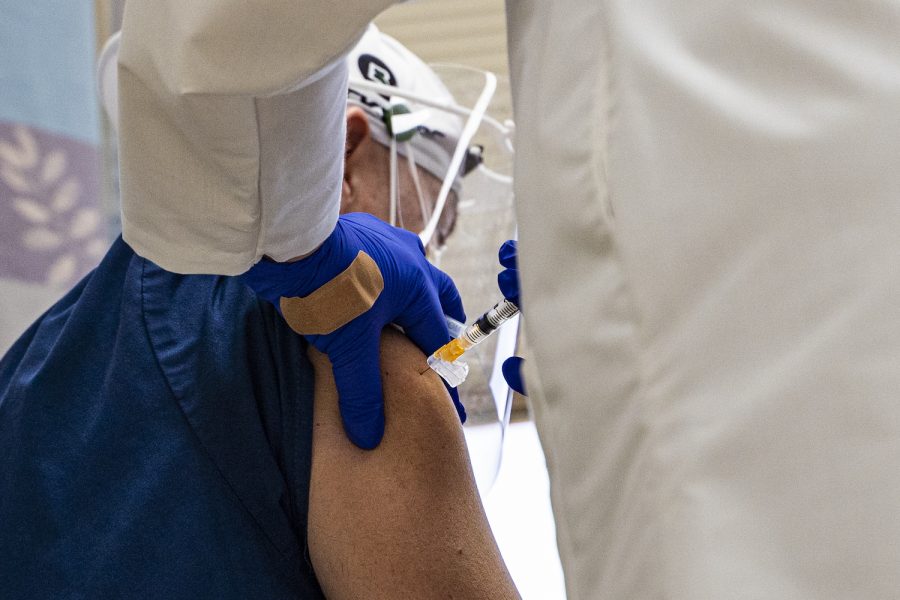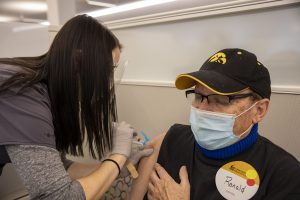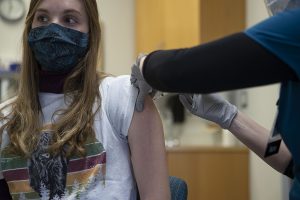Warning from legal experts: posting COVID-19 vaccine cards on social media creates risk for identity theft
Many people have been excited to share photos of their COVID-19 vaccine cards on social media, but legal experts warn that sharing these photos on public accounts may be giving identity thieves access to personal information.
Shivansh Ahuja for The Daily Iowan
Patients are injected with the COVID-19 vaccine at the VA Medical Center in Iowa City on Tuesday, Dec. 22, 2020. The center received the Modern vaccine for its employees. (Shivansh Ahuja/The Daily Iowan)
February 18, 2021
The University of Iowa Carver College of Medicine and legal experts are warning Iowans that posting pictures of COVID-19 vaccination cards could put patients at risk for identity theft.
The cards contain sensitive details, such as a patient’s name, date of birth, vaccination site location, and occasionally, medical ID number. Assistant Professor of Law Anya Prince said all this data taken together could provide important information to nefarious actors.
When sharing potentially sensitive medical information on social media, Prince said it’s important to consider who you’re sharing it with and how long it stays on your page.
“If I have four Instagram followers and my account setting is all on private, then there are fewer people who get that information versus if I have a public account,” Prince said. “If it’s not broadcast widely then maybe that’s more protected than if it’s on a public Facebook post. However, for a lot of social media, even something that’s taken down right away will always have some record somewhere.”
Patient Access Specialist at the UI Hospitals and Clinics Sam Billingsley said he was aware of the privacy concerns when he shared a picture of his vaccine card on his Instagram and Facebook accounts.
Although he considered blocking out the information before posting, Billingsley said the handwriting on his card was so messy that he wasn’t really worried about someone using it to obtain his personal information.
He added that he received positive responses on both his Facebook and Instagram accounts after sharing the photo and was able to be a resource for friends who reached out with questions.
RELATED: Health care workers ‘delighted’ to receive the second dose of the COVID-19 vaccine
“I’ve been fielding a lot of questions about how [the vaccine] impacted me and if that’s something that somebody else would be able to handle,” Billingsley said. “I’ve always loved being somebody that people can come to for questions or help. That’s just what I like to do so it’s nice.”
After getting her first dose of the Pfizer vaccine, UI junior Josi Gilbertson said she wanted to post on her Facebook account so that her older relatives could hear about her experience. She uploaded a photo of a nurse administering her vaccine, along with a brief message about the importance of doing her part to stop the spread of the virus.
Much like Billingsley, Gilbertson said she wanted to share on Facebook so that her family could learn more about the vaccination process.
“I just wanted to reach out on a bigger platform where older people would see,” Gilbertson said. “It looks like people in our generation, who I have on more intimate socials like Twitter and Instagram, are already on the same page [about the vaccine] as I am.”
Prince said she recognizes the potential public health benefits of people sharing their positive experiences with the COVID-19 vaccine, but emphasized that some posts may be more secure than others.
“Maybe you don’t share a picture of the vaccine card itself, but you share a picture of your band-aid from the shot,” she said. “There can be other ways of showing excitement without sharing that personal identifying information.”
If people are looking for more ideas on how to securely share their vaccine status, the Better Business Bureau suggests patients post pictures of their official COVID-19 vaccine sticker or use a profile frame to tell their followers about their experience, according to their website.
For those considering getting the vaccine, Billingsley said they shouldn’t feel like they have to share their experience on social media.
“It’s a very common thing right now for everybody to be posting ‘oh here’s my vaccine card’ but you also don’t have to,” Billingsley said. “You can just write a note on Facebook, you don’t have to post a picture. Don’t feel like you have to do that. But please get your vaccine, whether you post about it or not.”






